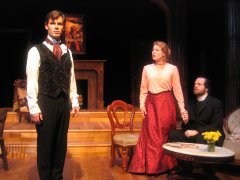
Paulanne Simmons
Shaw without the Smile
 |
| "Candida" at Jean Cocteau Rep |
"Candida"
Jean Cocteau Repertory
Bowerie Lane Theatre
330 Bowery at Bond at Bond St.
Opened Dec. 28, 2005
Wed. 7 p.m.; Thu. –Sat. 8 p.m.; Sun. 3 p.m.
$40-$50, (212) 279-4200
Closes Jan. 28, 2006
Reviewed by Paulanne Simmons Jan. 5, 2006
George Bernard Shaw was born in 1856 and died in 1950. But, in many ways, he was a man of the 21st century. The political, economic and social problems he confronted remain unresolved today. And although his personal relationships with women were sometimes difficult, he was undoubtedly a feminist. In fact Shaw created some of the most powerful and engaging women ever seen on stage.
In "Candida," now revived at the Cocteau Classical Theatre on the Bowery, under Michael Halberstam's direction, the title character is a 35-year-old wife and mother who "can always manage people by engaging their affection, and who does so frankly and instinctively without the smallest scruple."
Candida is adored by her husband, the crusading reverend James Morell; admired by his curate, the reverend Alexander Mill (Lexy); and beloved by her father, the rascally Mr. Burgess. Problems arise when Morell finds Eugene Marchbanks, an 18-yeaar-old sleeping on an embankment and brings him into the household.
Eugene, who combines passive and aggressive behavior in a typically adolescent way, forces Morell into a confrontation and Candida into choosing between himself and her husband.
In less capable hands, Candida might be a melodrama worthy of daytime television. But the great GBS has made the play into what might be a very funny comedy. Unfortunately, despite some very capable acting, this production misses the boat.
The problem lies primarily with Armanda Jones's portrayal of Candida. Although Jones is appropriately charming and desirable, she lacks the dignity and rectitude that should make her decision a foregone conclusion. In this production, Candida comes off as a flirt with sadistic tendencies, not the steadfast woman who stands in sharp contrast to the pompous Morell (David Tillistrand) and the self-dramatizing Marchbanks (Danaher Dempsey).
This play is funny because the struggle between Morell and Marchbanks resembles a fistfight in which two men throw punches at the air. There is simply no contest. But Candida's determination and sense of responsibility not only invalidate their struggle, but also validate her displeasure with both men who insist on fighting over her as if she were a piece of property.
Kate Holland as Morell's secretary, the pert and spinsterish Miss Prossy, does create some fine, comic moments and Angus Hepburn gives Burgess the earthy humor and good nature the part demands. But the central conflict of this play, thanks to Halberstam's misdirection, is not about how Candida puts both men in their place, but about which of the two she will chose.
Instead of laughing, the audience is either worrying or just plain confused.

| museums | NYTW mail | recordings | coupons | publications | classified |